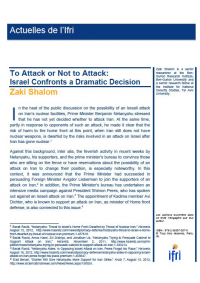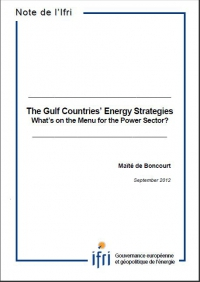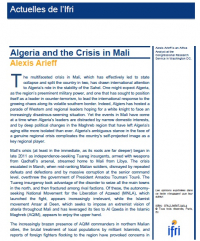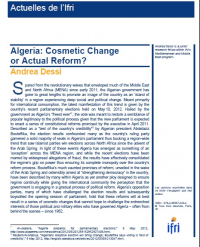Over the last ten years, Kuwait's power consumption has doubled. This rising need for electricity has been mainly driven by the fast population growth rate, the increasing need for desalinated water, accounting for 93% of water consumption, and the economic development of the country.

Middle East / North Africa
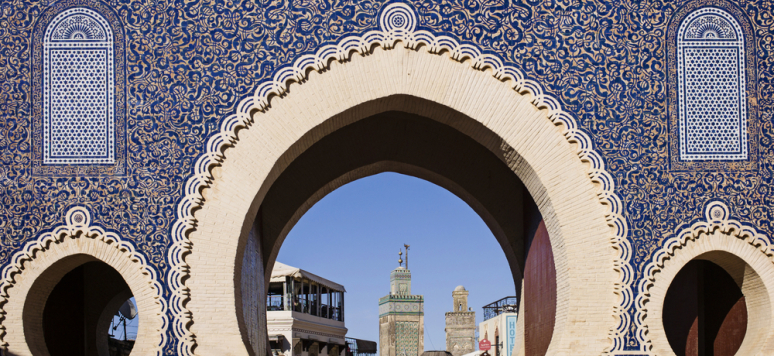
The Middle East and North Africa Programme at IFRI aims to provide expertise on the trends and developments in politics, societies and economies across the region.
The programme has the following objectives:
- Proposing a new approach towards the MENA region through an analysis of local, regional, and international dynamics with the potential to guide and influence new policies ;
- Highlighting the role of foreign powers which have traditionally been present in the region and analyzing the new role taken on by emerging countries ;
- Anticipating new directions and outlooks in each country;
- Interpreting risks and potentials and puting forward new templates for analysis.
The programme has built a dense network of researchers and experts who provide expertise on the MENA region and working together on a range of crosscutting themes.
Senior Research Fellow, Head of Ifri’s Türkiye and...
Research Fellow, Türkiye and Middle East Program
...Associate Research Fellow, Türkiye and Middle East...
Senior Advisor for North Africa and the Middle East
Research Interests:
- North Africa
- The Middle East
Associate Research Fellow, Türkiye and Middle East Program
...Associate research fellow, Turkey and Middle East Program
...On Tuesday 10 April 2012, Osama bin Laden was finally replaced on the FBI’s most wanted list by a fugitive schoolteacher accused of possessing child pornography. As the United States’ perception of threat has shifted, so too has the broader national security discourse. The prominent al-Qaeda...
In the heat of the public discussion on the possibility of an Israeli attack on Iran’s nuclear facilities, Prime Minister Benjamin Netanyahu stressed that he has not yet decided whether to attack Iran. At the same time, partly in response to opponents of such an attack, he made it clear that...
The futuristic green city of Masdar in the United Arab Emirates or the latest announcements of Saudi Arabia which might now well become the new Eldorado for solar energy companies have a clear marketing varnish. But if they are showcases of green ambitions, they nonetheless reflect the...
The dynamics of Muslim-Copt relations and how they are managed by the Church and the State are part and parcel of Egypt’s transition post-Mubarak because they underlie the discussions concerning Egypt’s future as a civil State. The treatment of Copts and other religious communities under a new...
The multifaceted crisis in Mali, which has effectively led to state collapse and split the country in two, has drawn international attention to Algeria’s role in the stability of the Sahel. One might expect Algeria, as the region’s preeminent military power, and one that has sought to position...
Algeria has emerged as something of an “exception” across the Middle East and North Africa (MENA) region, and while the recent elections have been marred by widespread allegations of fraud, the results have effectively consolidated the regime’s grip on power thus ensuring its complete monopoly...
The Arab Revolts and Southeast Asia: What Impact and What Influence? Actuelles de l'Ifri, June, 2012
Southeast Asia experienced its own political upheavals well before the Arab revolts. Nevertheless, the wave of popular uprisings that shook the Middle-East and North Africa region goes far beyond the region’s boundaries, and Southeast Asia is no exception to the global crisis of confidence...
A quick look at the news dealing with the Syrian uprising the last year shows a slow progression from protests and civil resistance towards violence. The Obama Administration’s policy dealing with what many have called “slow motion revolution” has evolved in fits and starts, with mixed...
This paper highlights how the Arab Spring magnified a two-dimensional gap in South Africa’s foreign policy. First that South Africa does not have a vision which reconciles demands for achieving the goals of protecting human rights, sovereignty, and multilateralism; second, that its strategies...
Aucun résultat











